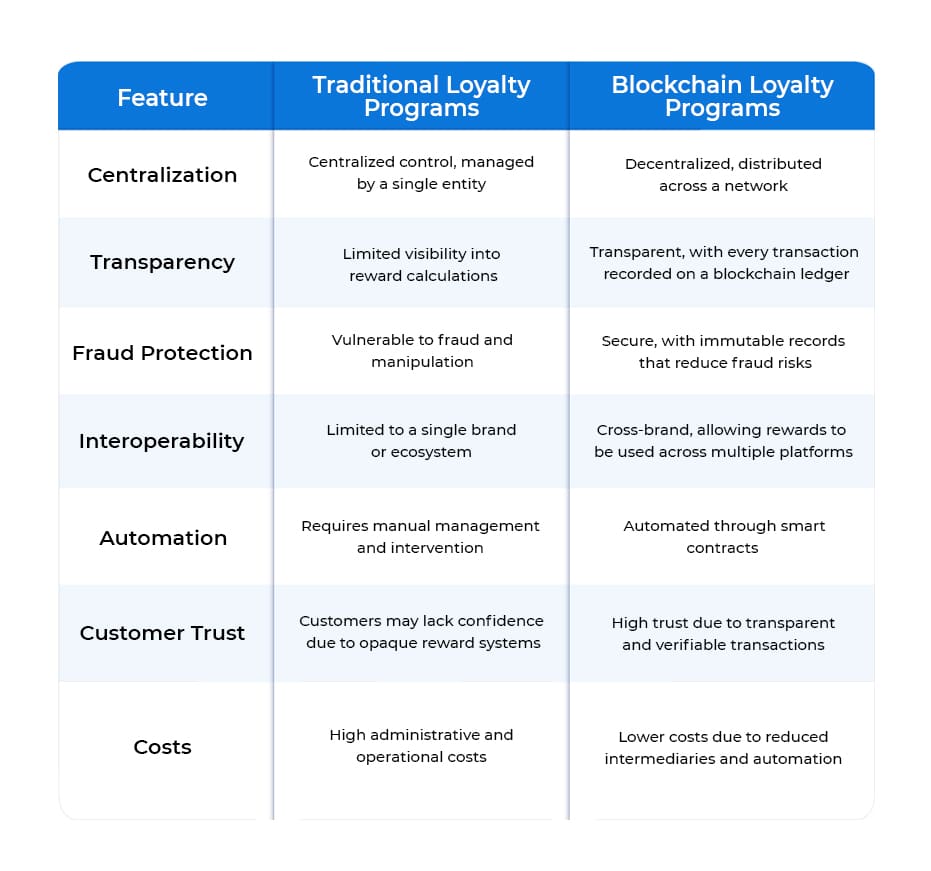Daily Pulse: Global Insights
Your daily source for news and insightful information from around the globe.
When Loyalty Goes Digital: How Blockchain is Changing the Game
Discover how blockchain is revolutionizing loyalty programs and creating new opportunities for brands and customers alike!
The Future of Loyalty Programs: How Blockchain is Revolutionizing Customer Engagement
The loyalty programs of the future are poised to undergo a significant transformation, thanks to the integration of blockchain technology. As traditional programs often suffer from issues like lack of transparency, data security concerns, and limited redemption flexibility, blockchain offers a robust solution. Through a decentralized ledger, businesses can create immutable records of customer interactions, enhancing trust. This greater level of transparency not only boosts customer engagement but also allows for seamless transaction tracking, making it easier for customers to understand their loyalty rewards and how to use them.
Moreover, blockchain-based loyalty programs can facilitate interoperability among different brands and platforms. For instance, customers could accumulate points from various retailers and redeem them across an entirely different network, creating a more cohesive shopping experience. This shift towards a more interconnected rewards system not only provides increased value to consumers but also encourages brand loyalty in an era where choices are abundant. As companies begin to recognize the undeniable potential of blockchain, the landscape of customer engagement will evolve dramatically, paving the way for innovative and rewarding experiences.

Counter-Strike is a popular first-person shooter game that emphasizes teamwork and strategy. Players engage in various scenarios where they can take on the roles of terrorists or counter-terrorists, aiming to complete objectives like planting bombs or rescuing hostages. If you're looking for some extra in-game benefits, check out this shuffle promo code to enhance your gaming experience.
Understanding Blockchain Technology: Unlocking New Possibilities for Loyalty Solutions
Understanding Blockchain Technology is crucial in today's digital landscape, especially as businesses seek innovative solutions to enhance customer engagement and loyalty. Blockchain offers a decentralized and secure method of recording transactions that can revolutionize loyalty solutions. By utilizing smart contracts and transparent ledgers, companies can create loyalty programs that are more efficient, reliable, and appealing to customers. This technology not only increases security but also enables the safe sharing of customer data across various platforms, allowing businesses to tailor their offerings based on real-time analytics.
The integration of blockchain into loyalty programs presents several new possibilities:
- Transparency: Customers can track their rewards easily.
- Immutability: This ensures the integrity of loyalty points, making fraud virtually impossible.
- Interoperability: Blockchain can allow customers to use rewards across different vendors, enhancing their experience.
As companies continue to explore these new avenues, understanding blockchain technology will be key to unlocking the full potential of loyalty solutions that resonate with the modern consumer.
Is Your Loyalty Program Ready for Blockchain? Key Considerations for Businesses
As businesses increasingly seek innovative ways to enhance customer engagement, the integration of blockchain technology into loyalty programs is gaining traction. With its ability to offer unprecedented transparency, security, and traceability, blockchain can transform traditional loyalty systems into more robust and customer-centric platforms. When considering this transition, it's essential for businesses to assess the current infrastructure of their loyalty programs, ensuring that they can accommodate blockchain's decentralized nature. Factors such as compliance with data protection regulations and the ease of integration with existing systems must be addressed.
Moreover, businesses should keep in mind that implementing a blockchain-based loyalty program involves several technical and operational considerations. Key elements include selecting the right blockchain framework, creating a user-friendly interface, and ensuring seamless experiences across different customer touchpoints. Companies must also evaluate the long-term implications of blockchain adoption on their reward mechanisms and customer interactions. Ultimately, a successful transition hinges on a deep understanding of both the technology and the desired outcomes, empowering businesses to foster stronger customer loyalty in a digital-first world.